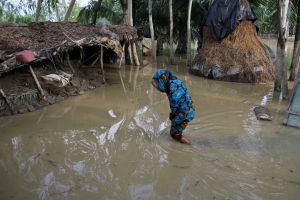Cash Helps Flood Affected Families In Northwest Bangladesh Get Back On Their Feet
Some 42,500 people in northwest Bangladesh are to receive financial assistance through a WFP initiative, enabling them to buy food and other necessities they lost when the area was hit by recurrent monsoon floods from August.

Bangladesh: a woman wades knee-deep through her flooded homestead.
The poorest families in the worst-affected areas of Kurigram, Gaibandha, Sirajganj and Jamalpur districts will each receive 4,000 taka per month over the next three months (totalling US$150) to stabilize their food security and nutritional status. The money is being provided by the United Kingdom’s Department for International Development (DFID).
Paul Whittingham, Acting DFID representative said that the UK has always stood beside the people of Bangladesh in times of need and was committed to working together with its partners to help alleviate the suffering caused by this disaster.
WFP, in consultation with the local administration and NGOs, has appointed a senior woman from each of the 8,500 participating households to receive the money. Experience from Bangladesh and elsewhere shows that when women receive assistance like this, it has not only empowered them, but also improves food security and nutrition for the entire family.
Christa Räder, WFP Representative in Bangladesh, said that financial assistance is particularly important during prolonged disasters, when livelihoods are lost and work opportunities become scarce for months. “Thanks to this cash, families can retain a measure of choice over the food they get, and manage to eat well,” she said.
The first payments began last week, and the three cash disbursements will be completed by mid-January. To help ensure that the assistance reaches the most vulnerable, those in participating communities can voice any concerns by calling the WFP hotline.
Northwestern Bangladesh has experienced recurrent monsoon floods for much of the second half of 2016. Almost 4 million people were affected as large areas became inundated, more than 100 people died as a direct consequence of the floods, and 250,000 houses are destroyed or damaged. Experts warn that the current lean season could further reduce people’s food consumption.
The WFP scheme is part of a joint United Nations emergency operation in coordination with the government and humanitarian partners, aimed at alleviating immediate needs and making communities more resilient to future floods.
Source:World Food Programme
- 319 reads
Human Rights
Fostering a More Humane World: The 28th Eurasian Economic Summi

Conscience, Hope, and Action: Keys to Global Peace and Sustainability

Ringing FOWPAL’s Peace Bell for the World:Nobel Peace Prize Laureates’ Visions and Actions

Protecting the World’s Cultural Diversity for a Sustainable Future

Puppet Show I International Friendship Day 2020

